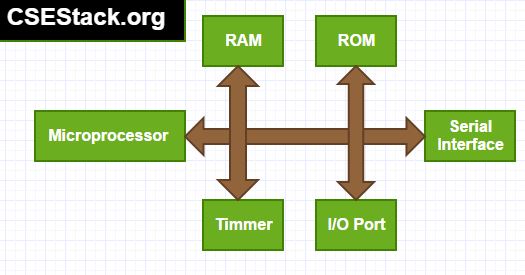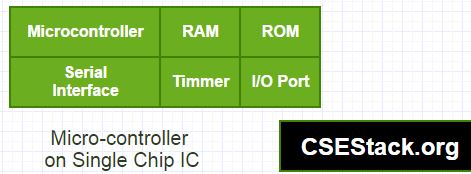
The microprocessor and microcontroller are the basic electronic components. Based on the architecture both the components are different. They are widely different from each other but hardly many people know about it.
Both have their importance and uses.
In this post, we will see all the differences between microprocessors and microcontrollers. Before that, you should know the definition and working details of each component.
Table of Contents
The microprocessor is the electronic component. It is a kind of computer processor that resides on single or multiple integrated circuits (IC). This IC contains many other electronic components such as a resistor, transistor, and diode…
The microprocessor performs all the functions of the central processing system. One way it differs from the CPU as it occupies a small space and resides on only a couple of integrated circuits.
It does not have an I/O peripheral component or internal memory. It requires external components such as RAM, ROM, timmer, Serial interface, and I/O port to operate.
Below is the block diagram of the microprocessor architecture.

In the above image, we can see that RAM/ROM (and other components) are externally connected to the microprocessor.
The microprocessor holds several instructions. Every instruction consists of multiple steps such as fetch, decode, execute, and store.
While running instructions in the microprocessor, it executes multiple steps such as fetching the input, Decodes instructions, Executes instructions, and Store results back in the memory.
Here, Instruction gets fetched and input is given externally using I/O components. The microprocessor executes an instruction. The result gets stored in the externally connected memory unit.
Now, another story…
The microcontroller is an electronic device. It has a processing unit along with fixed-sized ROM, RAM, and other required peripheral components. All the components are embedded on a single chip.
As it has all the components required to process and store data, it is also called a minicomputer or computer on a single chip.
Below is the block diagram of the architecture of the microcontroller.

It is widely used in embedded systems.
This is all about definitions of the microcontroller and the microprocessor. Now we see, the difference between a microprocessor and a microcontroller…
Comparing Microprocessor and Microcontroller:
How is the microprocessor different from the microcontroller? What are the specifications of the microprocessor and microcontroller?
I elaborate on this in the discussion of the microprocessor vs microcontroller below…
Microprocessors are widely used in computer systems. And microcontroller is used in embedded systems.
If the microprocessor is the heart of the computer system then the microcontroller is the heart of the embedded system.
The microprocessor uses Von Neumann architecture where data and programs are present in the same memory module.
The microcontroller uses Harvard architecture. In this module, data and programs are stored in separate memory.
The microcontroller can access data and programs at the same time as it is in a separate memory. This is one of the reasons microcontrollers are faster than the microprocessor.
The microprocessor cannot operate without peripheral components. It is only a processing unit and we have to attach all the required components externally to operate.
Whereas the microcontroller has a small processing unit along with internal memory to store and I/O components to give input. So it can work independently.
As we have to connect components externally, the microprocessor circuit becomes large and complex. In a microcontroller, all the components are internally connected, so the circuit becomes too small.
The microcontroller can be used in the compact system as it has a small size. It provides a better and more efficient technique in the compact system than the microprocessor.
Microprocessor requires external components to operate. So, the Cost of the microprocessor is higher than the microcontroller.
Microprocessor requires external components and their circuits are also complex. It requires more power consumption. So it is difficult to operate a microprocessor using battery power.
The microcontroller has very low external components. it manages all its operations inside a single chip. So it consumes a very low power supply as compared to the microprocessor. We can operate a microcontroller on the externally connected stored power such as a battery.
The microcontroller can have multiple modes of operation such as higher performance, balance, idle, or power saving mode. So if we operate the microcontroller in power-saving mode, the power consumption is reduced even more.
Most of the microprocessors do not have this power-saving feature.
The microprocessor has very less internal registers. It has to rely on external storage. So all the memory operations are carried out using memory-based external commands. Results in high processing time.
The microcontroller has many registers for instruction execution. Fetching data and storing data require internal commands. So its execution and processing time are lower than the microprocessor.
Intel Pentium series processor, core 2 duo, dual-core, Intel i3, and i5 are examples of microprocessors that are widely used.
Microcontrollers are produced by many hardware manufacturer companies such Motorola, Philips, Microchips, ATMEL…
The microprocessor is used in desktop personal computers, laptops…
The microcontroller is used in an embedded system such as an MP3 player, Television, Refrigerator, Washing Machine…
Hope you have cleared all your doubts about microprocessors and microcontrollers. If you are preparing for placement interviews or any computer science examination, understanding the difference between microprocessor and microcontroller is very important. Many of the company interviewers asked questions about it.
If you have any questions, feel free to comment below. I will try my best to get your question resolved.
Good comparison… very much useful… I am also listing some of the project ideas based on controllers on my website.
That’s great, Rahul 🙂 Hope this article has given you some leads for your project ideas.
Nice compilation, good piece of work.
Thanks, Dushyanth for your kind words 🙂
Very good comparison sir
Thanks, Barkha!
Glad to see you here.
Easy to understand the difference between them. Thank you so much!
You’r welcome, Jaya!
I’m glad as it helps you understand very well.